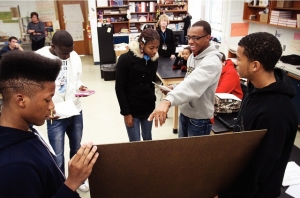Wayne Engineering in fifth year with successful record
By Phyllis Moore
Published in News on December 14, 2011 1:46 PM

News-Argus/MICHAEL BETTS
Wayne School of Engineering student Reikeme Cannon, right, points at a chemistry equation to classmate Brandy Johnson during a study review in Sula Teachey's honors chemistry class. The school, in its fifth year in Wayne County, features a strong curriculum of math and science courses, as well as the opportunity for students to earn college credits.
Gary Hales, principal at Wayne School of Engineering, says he thanks his bosses all the time for the opportunity to lead the district's newest high school.
The school is one of four in the state affiliated with the N.C. New Schools Project, which transforms existing schools or establishes new schools in non-traditional settings.
Introduced on the Goldsboro High School campus in the fall of 2007 with a class of 74 ninth-graders, each year since it has added another ninth-grade class as students move up. This past spring, it had its first graduating class, with 57 students.
It now has all four grades and 329 students.
"We have an application process to get in," Hales said. "Once a student applies and shows an interest, there's an interview to make sure this is what they want to do."
Then, using a lottery system, the school typically accepts 100 students a year.
While it started out with a STEM focus -- dominant in science, technology, engineering and math offerings -- Hales said its greatest appeal are the college classes students are allowed to take while still in high school.
"Instructional practices are what we hang our hat on, the innovative things that you don't find in a typical high school," he said. "A student is not going to be sitting at a desk all day long."
Wayne School of Engineering is a project-focused school with an engineering theme, officials say. Its unique curriculum includes a philosophy course for juniors and seniors, and an issues-based science class, as well as a community garden project for freshmen.
"That's part of the hands-on environment beyond the four walls of the classroom," Hales said. "They're given an opportunity to move at an individual pace.
"We're pushing that in those STEM ideas, but I think the main thing about a school that succeeds is the culture and developing a culture where kids support kids, teachers support teachers."
It's that "relationship piece" that has helped students thrive, and, in turn, made the program a popular draw among their peers in the community.
"I think the kids sell it now more than we do, which is what we wanted all along that helps sustain it," he said.
For the most part, the ratio of male/female students at the school has hovered at 50/50 and class sizes are kept relatively small.
"Math seems to be a subject area that separates kids more than anything," Hales said. "We want to make sure our math classes are smaller so we can really provide a lot more attention to those students. They take a math a semester, so we push them pretty hard."
Representatives from the New Schools Project visited the campus last week, interviewing staff and students on the merits of the program for an upcoming presentation to politicians.
Hales said he was proud to have an opportunity to brag a little bit about the progress made by his school.
"It's been wonderful," he said. "I thank my bosses all the time for letting me get in here and be creative and grow a program into a successful school here.
"It's special when you get to create your own ideas and see those things come to fruition and put in what we want school to be. We want kids to have fun when they come to school. We want kids to get involved."
Reflecting on the past five years since the school was introduced, he said it's been interesting to witness the building process.
"Every year we had new students, every year we had to change," he said. "I think it was most difficult for our first-year graduates. It was probably more difficult on them because they didn't get all the attention. Now we're at 329. We get some good kids here who work hard.
"We just try to prepare them the best we can."
